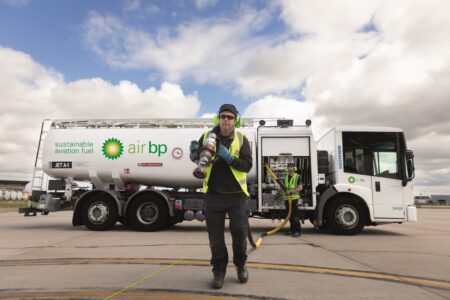Words by Air bp’s Dr Alisdair Clark
Ever wondered whether aviation fuel has a best before date? The short answer is yes, just like the food you buy in shops, aviation fuel has a storage life. This could be as short as six months or last for many years depending on the type of fuel and storage conditions. Dr Alisdair Clark takes a look at how Air bp and the wider aviation industry manages this and the factors involved.
The first aspect to consider when looking at an aviation fuel’s storage life is which product is in storage. Is it Avgas or Jet fuel?
Avgas, as a gasoline, must maintain a reasonable vapour pressure to perform correctly in an aircraft. Such volatility is required to ensure a fuel-vapour mixture can form to start and run the aircraft engine. The current manufacturing specification range is 38 to 49 kPa. However, high temperatures and small, vented tanks can cause fuel volatility to be lost. This is why the industry likes to include ‘Pressure – Vacuum’ valves on Avgas tank vents to prevent loss of low-boiling hydrocarbons. This is good news for the environment as well as product life.
Another consideration with Avgas storage is gum formation. This is when sticky, insoluble polymers form in the product by reacting with air. With the aviation industry mindful of such effects, the fuel must pass a strict requirement featuring 100 psi of pure oxygen/ 100 °C to ensure no problems. In addition, additives called antioxidants are used to help reduce gum formation. More about these in the jet fuel section below.
To investigate the influence of air on fuel storage, Air bp studied the impact of severe conditions on Avgas stored in drums in Dubai, where temperatures in August (the hottest month) average 36 °C. The study found that a full drum survived six months, while a ¼ full drum was border-line/ fail on gumdue to the larger volume of air in the container oxidising the fuel.
Jet fuel, as a kerosene product, does not have the same volatility requirements as Avgas. This is good news for storage stability and strategic use. Under the right conditions, Jet fuel can be stored for years and sometimes in very unusual tanks, such as caves underground. Similar to Avgas, there is the risk of gum formation due to oxidation from air. To control this effect antioxidants – special chemical additives in carefully limited amounts – are used. The additives are typically ‘hindered phenols’ which work by capturing any reactive oxygen species in the fuel to prevent gum formation. However, once all the antioxidant is used up, the fuel starts to degrade.
Another factor for consideration when storing Jet fuel is that it does not like catalytic metals such as copper. These, even at parts per billion concentration, can cause the fuel to become unstable when flowing through high temperature sections in an aircraft fuel system. Carbon deposits are formed, potentially impacting fuel/ oil heat exchanger performance and engine burner-feed arms. To ensure a long fuel life, brass and other catalytic metal alloys should not be used in Jet fuel storage tanks.
Microbial contamination is another risk with aviation fuel storage. If trace water is present in the storage tank microbes can grow at the fuel-water interface, feeding on the fuel and living in the water. Draining any water present in Jet fuel and Avgas storage tanks is crucial.
Quality control
Given the great variation in ambient conditions and tank designs around the world, the aviation industry has developed a protocol of periodic testing to monitor fuel quality in storage. This typically involves taking a representative sample every six months for laboratory analysis to ensure the product is ready for use. If a product has not been tested for some years due to remote location or another reason, a detailed evaluation is initiated. Just like a fine wine, testing offers assurance of quality.
With a global network covering environments as extreme as the freezing winters of Greenland and the searing hot summers of Texas, Air bp’s aspiration is to ensure a safe, reliable aviation fuel supply is always available. Fuel storage life is just one of many aspects covered each day to ensure Air bp can do just that.





